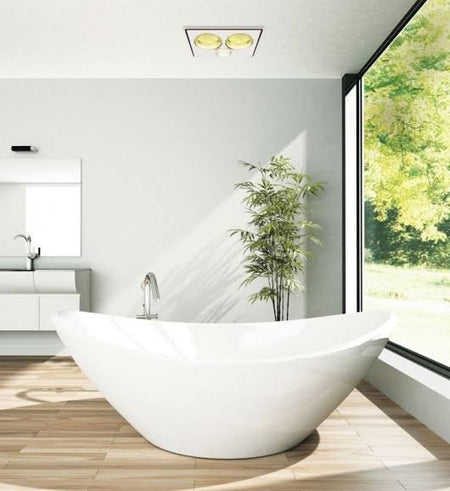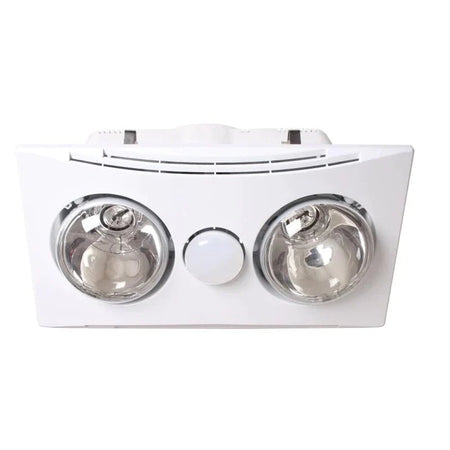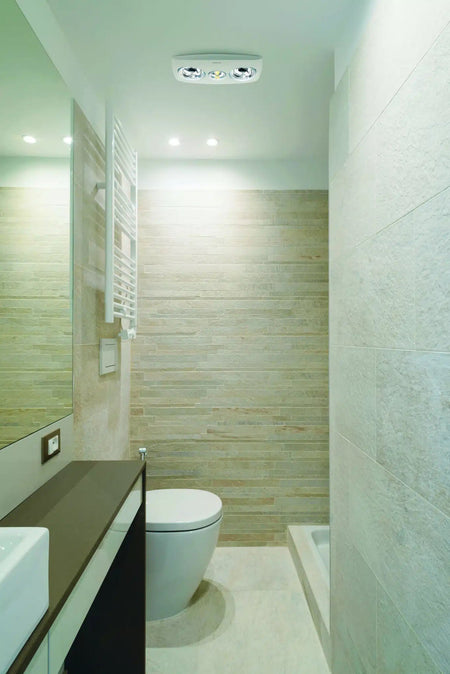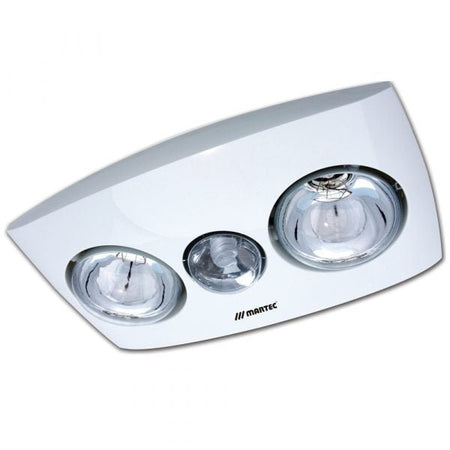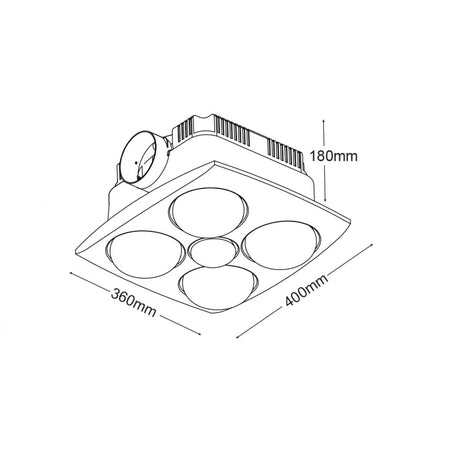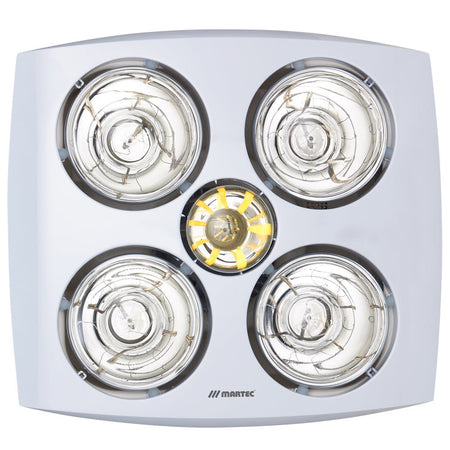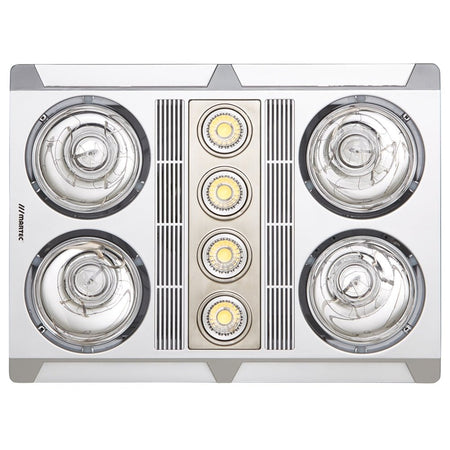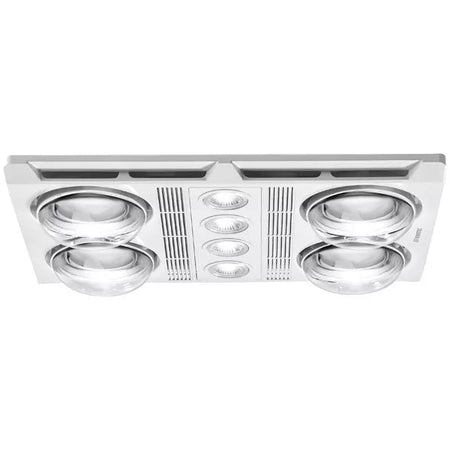Bathroom Heat 3 in 1
A 3-in-1 unit is a compact, all in one system for lighting, heating and ventilation for your bathroom.
It consists of three parts that operate separately. There is an infrared or ceramic heating element that produces instant heat, modern LED bulbs to provide excellent lighting options, and a built in exhaust system that extracts steam and moisture from the room.
Which Size Fan do I need? It starts with Room Size…
To choose the right exhaust fan, you need to know the size of the room. The exhaust fan needs to extract air to make space for fresh, clean air. So, it makes sense that room size relates to the strength of the fan you need. In the vast majority or residential installations, fresh air enters via a small gap under the door and this is adequate. Alternatively a door vent could be considered.
Every time the exhaust fan extracts the full volume of air in the room, you achieve one air change. The number of air changes to aim for depends on many factors, including what type of room. For example, in a bathroom, we suggest aiming for approximately 15 air changes per hour.
If you look at one of our exhaust fan product listings, you’ll see we measure exhaust fan capacity in m3/hr (cubic metres per hour). Look at this specification to see how many cubic meters of air a fan extracts in an hour. To work out how many air changes a fan will achieve based on room size, divide the fan’s capacity by the size of the room. The answer is the number of air changes possible with this setup. While there are other factors to consider, this information is a good start.
Step by step finding a fan with the right capacity
- Decide the number of air changes you’d like to achieve. We suggest aiming for 15 air changes in bathrooms and around 10 for toilets, but this is only a guide. It depends greatly on the environment.
- Measure the rooms length, width and height. Taking these measurements in meters will make things easier for you later because we measure our fans’ capacities in cubic meters.
- Multiply the length, width and height. Example: 2m long x 3m wide x 2.5m high = 15 m3
- Multiply the answer by the number of air changes you’d like to achieve.
Example: To find the capacity required to achieve 15 air changes in a 15m3 room, multiply 15 x 15 = 225. You’re looking for an exhaust fan with an approximate 225m3/hr capacity.
Please note the above article is intended as a guide, not as specific advice. Our general base recommendation is 15 air changes per hour for bathrooms. Based on our experience, extracting air at this rate prevents mould growth and condensation build-up in most installations. Please consider the factors below to decide whether you believe 15 air changes will be enough to meet your aims.
Other Factors to consider before choosing an exhaust fan:
Climate
Think of a window pane in winter. It’s cool, but when you switch on the heater, condensation forms on the glass as the warmer air meets the colder surface. The same effect happens on tiled walls and mirrors when you use a shower and the cooler these surfaces are, the more you’ll notice the condensation. No matter where you live, it’s likely you will notice some condensation in the bathroom. Still, there’s no denying that in some parts of Australia, winter temperatures dip lower than in other parts. Because of this, a bathroom in Melbourne or Hobart may visibly generate more condensation than one in Brisbane.
Steam Temperature
Hotter showers mean warmer steam. Warmer steam will create more condensation when it touches cool surfaces like your bathroom tiles or mirrors. Keep this in mind when you’re working out how many air changes you want to aim for.
Interior Design and building materials
If your room has lots of cool surfaces, like tiles or glass, you may require a higher extraction rate. For example a fully tiled floor to ceiling bathroom has more cool surfaces than a bathroom with tiles that just cover the shower area. Therefore a fully tiled room will visibly show more condensation than one that is partially tiled.
Expectations
The above two factors lead nicely into us talking about expectation levels and perception. No matter how powerful your exhaust fan is, it is unlikely that the fan will prevent ALL condensation from appearing. Simply because condensation will start to appear as soon as the warm air is in contact with a cooler surface, this happens faster when showers are warmer and temperatures are lower!
In fact it is very normal for a fan that is correctly specified in terms of extraction rate to still see visible condensation in the room and the mirror still fogging up, particularly if it’s a bathroom in winter and you have long hot showers! During these periods it may be a good idea to keep the fan running for approximately 10 – 15 minutes after you have left the room to assist with extraction.
Ducting
The further you duct your fan, the harder it will have to work. Over the lengths of a duct run, the fan’s pressure will start to drop off. If you need to run a long duct, get in touch with us to discuss your options. Best practice is to keep your duct run as short and direct as possible. Ensure that there are no unnecessary bends or twists in the ducting to maximise performance.
Secondly, remember that not all fans are ductable. Make sure that the fan you’re buying has a connection for ducting. This will be indicated on each of our exhaust fan listings individually. You can also find ducting in the right size listed as an accessory on the listing. We sell a comprehensive range of exhaust fan accessories.
If you use it correctly, your exhaust fan will assist in keeping your home healthy.
Martec Contour II 3-in-1 Bathroom Heater with 2 Heat Lamps, Exhaust Fan and LED Light
now $109.99 $142.00
Martec Forme 2 Light 3 in 1 Bathroom Heater & Exhaust Fan With Tricolour LED Light
now $139.99 $168.00
Martec Forme 4 Light 3 in 1 Bathroom Heater & Exhaust Fan With Tricolour LED Light
now $149.99 $194.00
Martec Profile Plus II - 3 in 1 Bathroom Heater With Exhaust Fan And 3 LED Lights
now $239.99 $292.00
Martec Profile Panel 2 High Performance 3 in 1 Bathroom Heater With Exhaust Fan
now $259.99 $384.00
Mercator Domini 3-In-1 Bathroom Heater With Exhaust Fan And CCT LED Light
now $289.99 $349.00
- 1
- 2

Shop Now, Pay Later – No Interest Lay-Buy
Shop what you love today with our flexible Lay-Buy option. Simply pay a 10% deposit, then split the balance into six easy monthly payments—completely interest-free!



